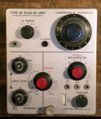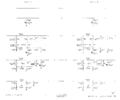W
Template:Plugin Sidebar 2 The Tektronix Type W is a differential comparator plug-in amplifier for 500-series scopes. Its bandwidth varies from 23 MHz to 8 MHz depending on gain. Type W is faster than its Type Z predecessor, and it extends performance in terms of sensitivity, reaching 1 mV/div. It achieves 20,000 to 1 common-mode rejection at DC and low frequencies. It was designed by John Horn.
Type W has two signal inputs, "A" and "B", and a built in precision variable voltage supply, "VC", which is controlled by a ten-turn pot and can vary from either −1.1 V to +1.1 V or −11 V to +11 V. A mode switch selects between displaying A−VC, A−B, or VC−B. The "A−B" mode is particularly useful for displaying the current in a sense resistor, while the other modes provide "slideback" measurements of small variations superimposed on a large constant. An output of VC is provided on the front panel for precision measurements.
Unlike the Type Z, Type W has two gain axes: a decade attenuator and a 1−2−5−10−20−50 selector, reminiscent of Type D from ten years before.
Type W is the only letter-series plug-in with an "infinite resistance" input mode selectable at the front panel. (Types 1A5 and 1A7 have an internal jumper that can be cut.)
Original production uses a pair of type 8056 Nuvistors in the front end. In 1971, at serial number 7000, Type W was converted to FET input to reduce drift. Modification kit 040-0590-00 was offered to retrofit existing instruments.
In the letter-series timeline of differential comparators, Type W, introduced in 1965, follows Type Z and precedes Type 1A5.
Specifications
please add
Pictures
-
Front view.
-
Top-left view.
-
Bottom view.
-
Block Diagram
-
Differential Comparator, initial version
-
Input Attenuators
-
Switching Diagram
-
A-phase (prototype) Type W
-
A-phase (prototype) Type W
-
A-phase (prototype) Type W
-
A-phase (prototype) Type W
-
A-phase (prototype) Type W











